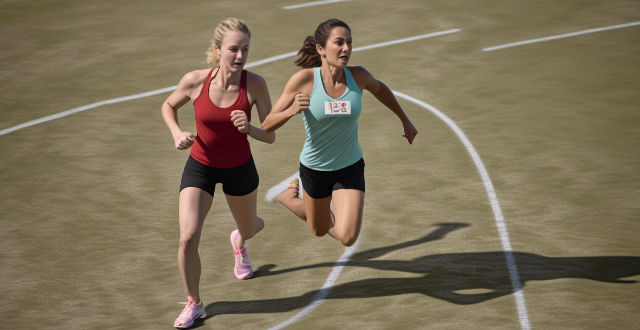Sleep is a critical determinant of athletic performance, significantly influencing reaction time and coordination. Adequate rest is crucial for muscle recovery and cognitive functions after daytime activities. Studies show that approximately 50%-78% of elite athletes suffer from some form of sleep disorder, with about 25% experiencing severe disorders. Shortened sleep duration negatively affects athletic abilities such as strength and anaerobic capacity. It also increases the risk of injuries by up to 1.7 times in those sleeping less than 8 hours per night. Proper sleep enhances cognitive functions, including decision making and reaction time, which are critical for success in sports. Sleep plays a vital role in the consolidation of motor skills, essential for coordination and precision in sports. Adequate sleep can reduce injury risks by up to 60%, suggesting better muscle recovery and maintenance of physical coordination. Short naps (20-30 minutes) can significantly improve alertness, attention, and overall mental state, leading to better performance. For athletes with sleep deficits, naps have been shown to ameliorate physiological and cognitive conditions, enhancing athletic performance. Combining a short nap with caffeine consumption can be an effective strategy to reduce post-lunch drowsiness and boost afternoon performance. Athletes aged 25 and above tend to report poorer sleep quality than their younger counterparts, indicating varying sleep needs across different age groups. Female athletes are more likely to experience sleep issues, necessitating tailored sleep strategies. Youth athletes should aim for 8 to 10 hours of sleep to support their developmental needs, while adult athletes should target 7 to 9 hours of sleep to ensure adequate recovery and performance optimization.

How Sleep Impacts Reaction Time and Coordination in Sports
Introduction
Sleep is a fundamental component of human health, particularly for athletes where it directly influences performance and recovery. This article explores the intricate relationship between sleep and its impact on an athlete's reaction time and coordination, supported by recent studies and expert opinions.
Sleep Quality and Athletic Performance
Importance of Sleep for Athletes
- Recovery Process: Adequate rest is crucial for muscle recovery and cognitive functions after daytime activities. Insufficient sleep can impede memory consolidation, cognitive skills, and learning processes.
- Immune System: Sleep affects the immune system. A weakened immune response due to lack of sleep can expose athletes to higher risks of illnesses, affecting their performance and training schedules.
Sleep Disorders in Athletes
- Prevalence: Studies show that approximately 50%-78% of elite athletes suffer from some form of sleep disorder, with about 25% experiencing severe disorders.
- Consequences: Shortened sleep duration negatively affects athletic abilities such as strength and anaerobic capacity. It also increases the risk of injuries by up to 1.7 times in those sleeping less than 8 hours per night.
Impact of Sleep on Reaction Time and Coordination
Reaction Time
- Cognitive Function: Proper sleep enhances cognitive functions, including decision making and reaction time, which are critical for success in sports.
- Performance Improvement: Extended sleep (about 8.4 hours per night for three nights) has shown to improve performance in endurance athletes compared to their regular sleep patterns.
Coordination
- Motor Skills: Sleep plays a vital role in the consolidation of motor skills, essential for coordination and precision in sports.
- Injury Prevention: Adequate sleep can reduce injury risks by up to 60%, suggesting better muscle recovery and maintenance of physical coordination.
The Role of Naps in Athletic Recovery
Benefits of Napping
- Enhanced Performance: Short naps (20-30 minutes) can significantly improve alertness, attention, and overall mental state, leading to better performance.
- Physical Recovery: For athletes with sleep deficits, naps have been shown to ameliorate physiological and cognitive conditions, enhancing athletic performance.
Strategies for Effective Napping
- Caffeine Naps: Combining a short nap with caffeine consumption can be an effective strategy to reduce post-lunch drowsiness and boost afternoon performance.
Optimal Sleep Duration for Athletes
Age and Gender Factors
- Age Considerations: Athletes aged 25 and above tend to report poorer sleep quality than their younger counterparts, indicating varying sleep needs across different age groups.
- Gender Differences: Female athletes are more likely to experience sleep issues, necessitating tailored sleep strategies.
Recommendations for Sleep Duration
- Youth Athletes: It is recommended that young athletes aim for 8 to 10 hours of sleep to support their developmental needs.
- Adult Athletes: Healthy adults, including athletes, should target 7 to 9 hours of sleep to ensure adequate recovery and performance optimization.
Conclusion
Sleep is a critical determinant of athletic performance, significantly influencing reaction time and coordination. Coaches and athletes should prioritize sleep as part of their training regimen, adopting good sleep hygiene practices and monitoring sleep patterns to maximize sporting results. Future research should continue to explore the optimal sleep strategies for athletes, considering factors such as age and gender to further refine recommendations.